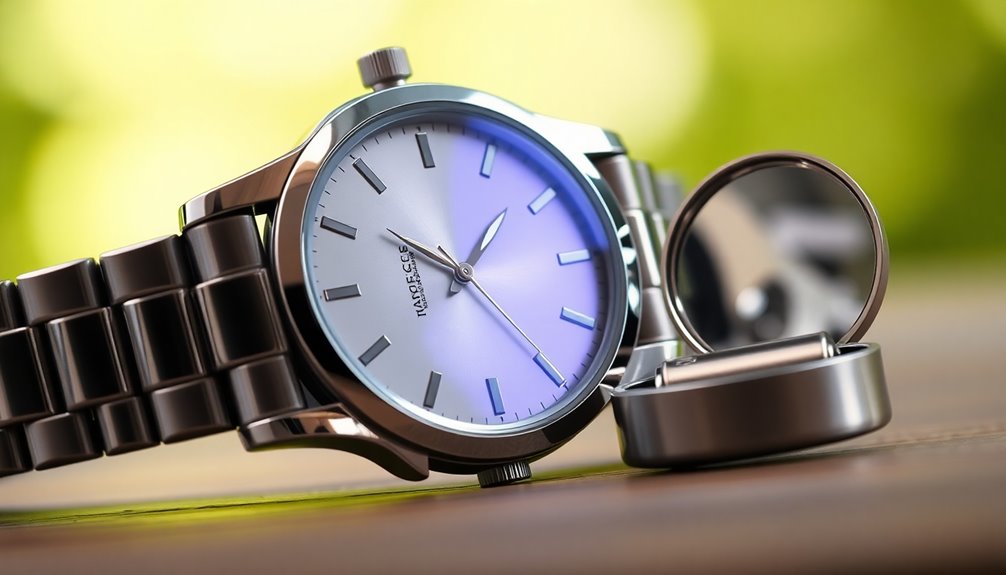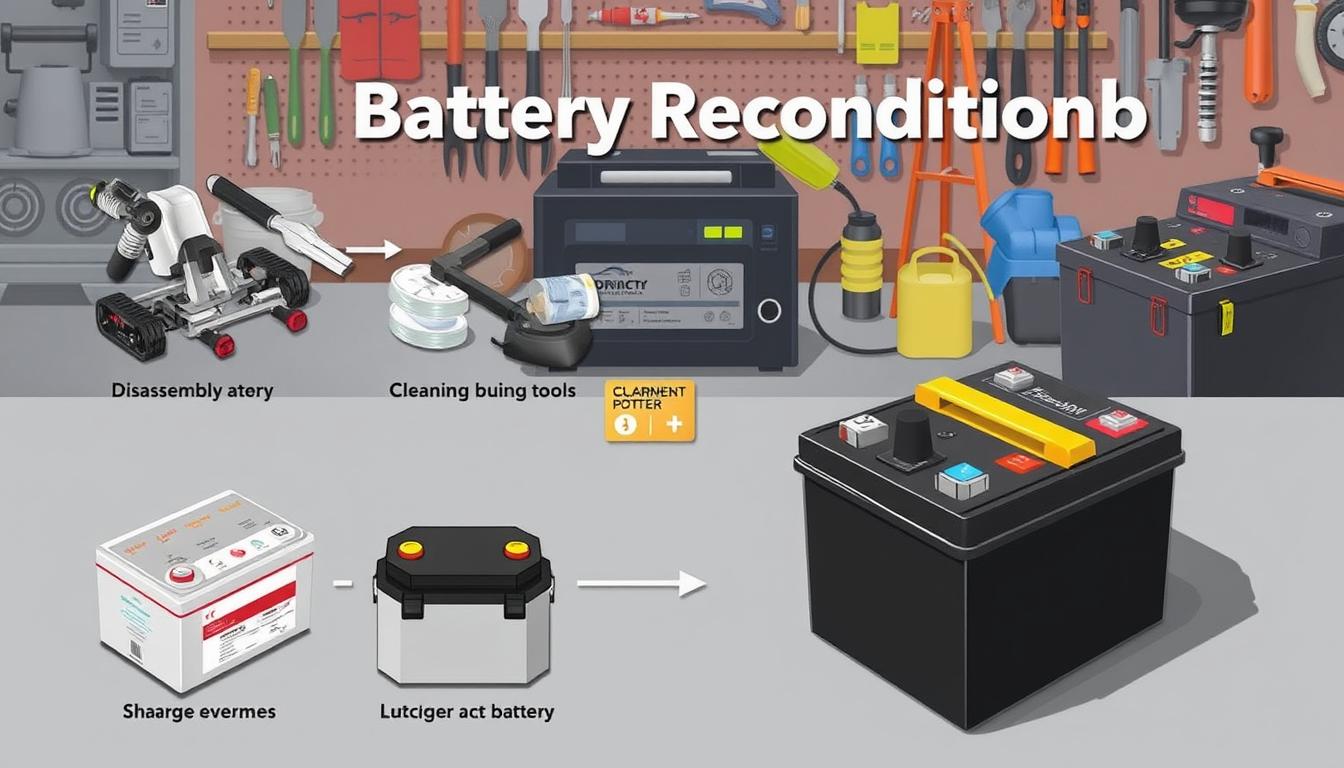Watch batteries typically last between 1 and 20 years, depending on the type you've got. Silver oxide batteries last around 1 to 5 years, while lithium ones can keep your watch ticking for 2 to 10 years. If you're using a solar-powered watch, you might enjoy 10 to 20 years of battery life. Factors like usage frequency and environmental conditions can also impact their lifespan. Watch out for signs like timekeeping issues or a stopped watch, which indicate a needed battery change. There's plenty more to discover about maintaining your watch and keeping it running smoothly!
Key Takeaways
- Silver oxide batteries typically last 1 to 5 years, while lithium batteries last between 2 to 10 years depending on usage.
- Solar-powered watches can provide battery life of 10 to 20 years by utilizing light for energy.
- Factors like usage patterns and environmental conditions significantly influence battery lifespan.
- Regular maintenance and monitoring of signs like timekeeping issues help prevent unexpected battery failures.
- Proper storage in protective cases and avoiding extreme temperatures can extend battery longevity.
Types of Watch Batteries

When it comes to watch batteries, there are three main types you should know about: silver oxide, lithium, and solar-powered batteries.
Silver oxide batteries are commonly used in quartz watches and typically last between 1 to 5 years, ensuring reliable performance.
If you have a modern digital watch, lithium batteries might be your go-to option, boasting a battery life of 2 to 10 years due to their high energy density.
For those eco-conscious consumers, solar-powered batteries shine brightly, lasting an impressive 10 to 20 years by harnessing light energy.
Understanding these types of batteries can greatly impact your watch maintenance and battery longevity, helping you plan for timely watch battery replacements and keeping your timepiece ticking smoothly.
Factors Affecting Battery Life

Understanding the types of watch batteries is just the beginning; several factors can influence their lifespan considerably. The type of battery you choose matters, as shown in the table below:
| Battery Type | Average Lifespan |
|---|---|
| Silver Oxide Battery | 1 to 5 years |
| Lithium Battery | 2 to 10 years |
| Solar Power | Up to 20 years |
Your usage patterns also play a role; regular wear keeps watch mechanisms active, while infrequent use leads to quicker battery depletion. Additionally, environmental conditions like extreme temperatures can accelerate deterioration. Finally, regular maintenance is essential for enhancing battery longevity by preventing moisture ingress and ensuring proper sealing, which ultimately boosts performance and lifespan.
Signs You Need a Replacement
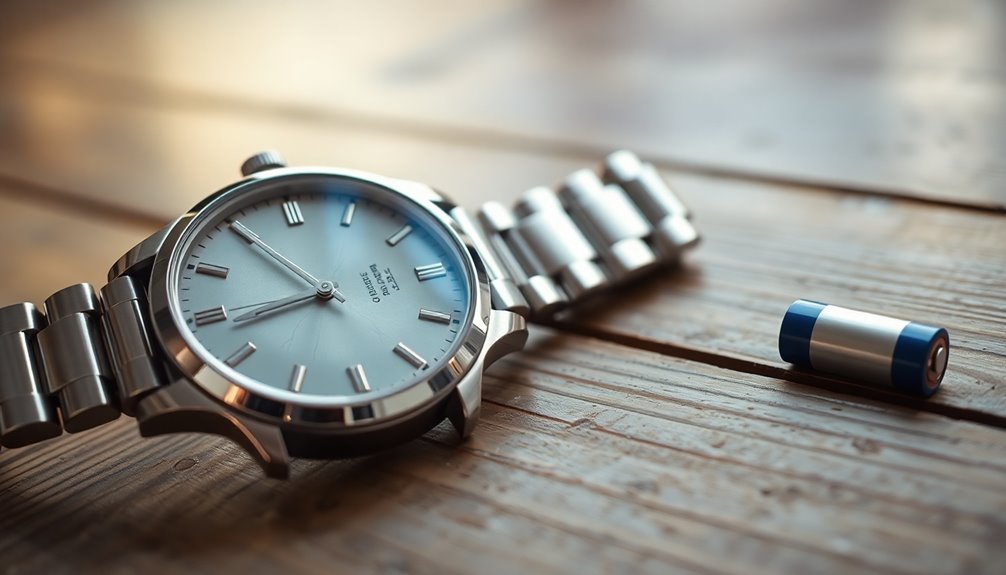
How can you tell if your watch needs a new battery? First, if your watch has stopped running, it's likely due to a dead battery and requires immediate replacement.
You should also pay attention to timekeeping; if your watch is losing time consistently, the battery may be nearing the end of its lifespan.
Watch for signs of water damage, like a foggy face or rust, as these indicate a compromised battery that needs replacement.
A swollen watch case signals pressure build-up from a faulty battery, which could lead to further issues.
Finally, if you notice a jerky second-hand movement, it's a sign of insufficient battery power, meaning it's time to get that replacement and keep your timepiece ticking accurately.
Maintenance Tips for Longevity
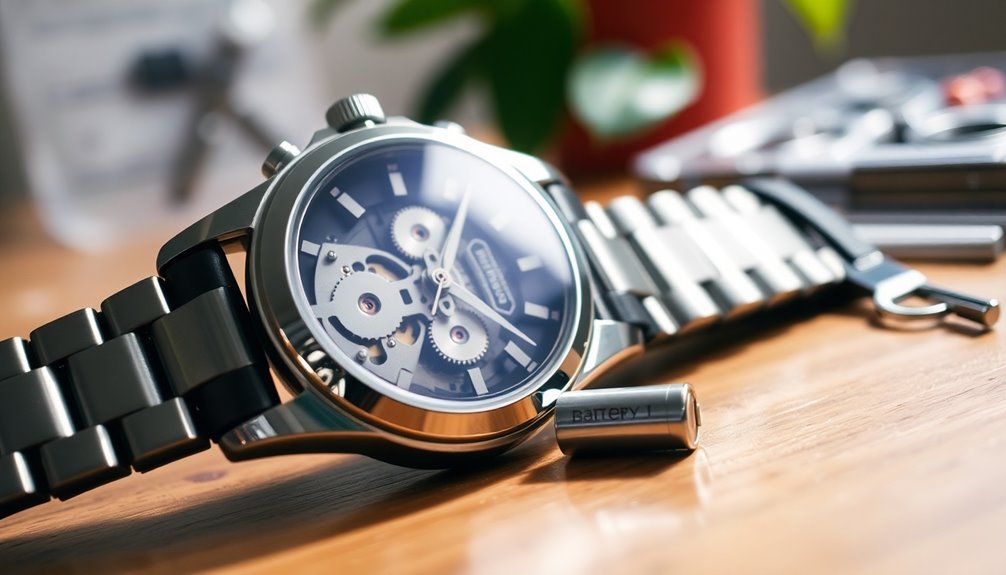
Recognizing the signs that your watch needs a new battery is just the first step in guaranteeing its longevity. Follow these maintenance tips to extend its lifespan:
| Tip | Benefit |
|---|---|
| Regularly servicing | Prevents issues, guarantees peak performance |
| Monitor for signs | Allows timely battery replacements |
| Conserve battery | Use low power mode on features |
| Avoid extreme temperatures | Protects battery performance |
| Proper storage | Prevents damage from moisture |
Additionally, ensuring your watch is maintained can help improve overall performance and prolong its life.
Best Storage Practices
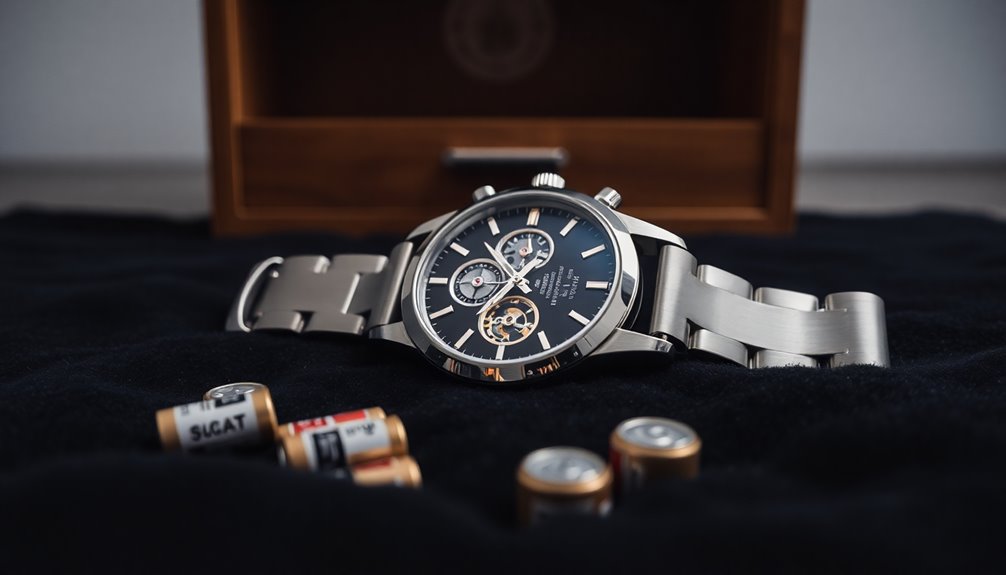
When you store your watch properly, you not only protect its appearance but also boost its battery life.
The best storage practices involve using protective cases to shield your timepiece from dust, moisture, and temperature fluctuations that can affect battery performance.
In humid environments, opt for moisture-proof cases or include silica gel packs to prevent battery corrosion.
Keep your watches in a climate-controlled environment, as extreme temperatures can greatly shorten battery life.
Regularly inspect your stored watches for signs of moisture or battery issues to guarantee timely maintenance and care.
For mechanical and automatic watches, consider using watch winders to keep them operational when not worn, preventing battery drain and movement degradation.
Choosing the Right Watch

Selecting the right watch can significantly affect your experience and satisfaction, so it's essential to take into account a few key factors.
First, consider the battery type; a quartz watch with a silver oxide battery lasts 1 to 5 years, while lithium batteries can last 2 to 10 years, impacting your maintenance schedule. If you want minimal battery replacements, opt for solar-powered watches, which can keep ticking for 10 to 20 years by harnessing light energy. Additionally, choosing a watch with low power consumption can also contribute to extending its battery life.
Next, evaluate the watch's features. Multifunctional watches may drain power faster, shortening battery lifespan.
Finally, assess your frequency of use; wearing the watch regularly keeps its mechanisms active. Don't forget to personalize it with options like water resistance to guarantee it fits your lifestyle.
Frequently Asked Questions
How Long Does It Take for a Watch to Stop Ticking?
A watch can stop ticking in various timeframes, depending on its type and usage.
For quartz watches, you might notice it halting after 1.5 to 3 years if the battery runs out.
Mechanical watches can tick for years if you wind them regularly, but they'll stop if left unwound too long.
Also, extreme temperatures or humidity can speed up this process, so it's crucial to keep an eye on your watch's performance.
How Do I Know if My Watch Needs a New Battery?
To know if your watch needs a new battery, watch for a few signs.
If it's stopped completely, that's a clear indicator.
If it's losing time or the second hand's jerking, it might be running low.
Look for water damage like foggy glass or rust; these often signal battery failure.
Finally, if the case is swollen, it's essential to replace the battery immediately to avoid further damage.
What Is the Average Life of a Watch Battery?
So, you think your watch battery's a superhero? Sorry to burst that bubble!
The average lifespan of a watch battery usually hovers between 1 to 5 years, depending on the type and features. If you've got a fancy lithium battery in a digital watch, it might last up to 10 years.
But remember, extreme temperatures and humidity can turn your timepiece from hero to zero in no time. Keep it safe!
Do Watch Batteries Go Bad if Not Used?
Yes, watch batteries can go bad if you don't use them regularly. Prolonged inactivity may drain the battery and reduce its performance.
Environmental factors, like temperature and humidity, can worsen this deterioration. To keep your watch in good shape, consider storing it in a climate-controlled environment and using protective cases.
Regularly wearing your watch or using a watch winder can help keep the movement active and extend the battery's life.
Conclusion
To summarize, keeping your watch ticking involves understanding its battery life. Did you know that a typical quartz watch battery lasts between 1 to 3 years? By considering the type of battery, caring for your watch, and knowing when to replace it, you can enjoy your timepiece longer. Remember to store it properly and choose the right watch for your lifestyle. With a little attention, you can guarantee your watch keeps perfect time for many years to come!

